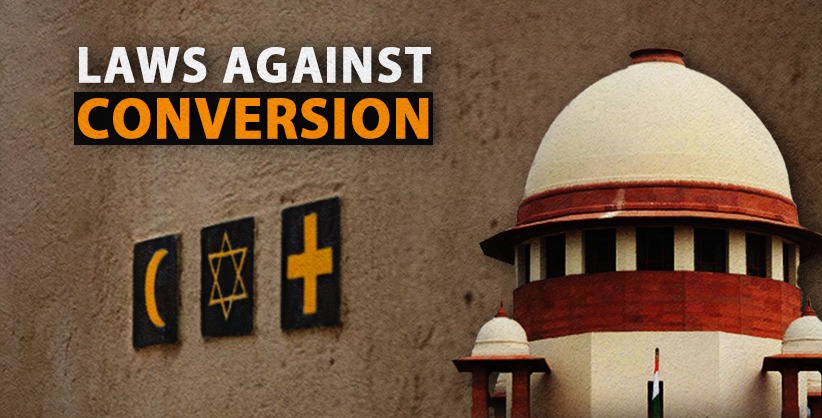NEW DELHI: Jamiat Ulama-I-Hind has approached the Supreme Court, challenging validity of anti-conversion laws passed by states of Uttar Pradesh, Uttarakhand Madhya Pradesh, Himachal Pradesh and Gujarat, apparently to check 'love jihad' cases.
"The provisions of the impugned Acts which entitle the family members to lodge an FIR, virtually give them a fresh tool for harassing the convert. The Acts are being misused by the disgruntled family members," the plea said.
The Muslim scholars body has claimed the provisions of the laws forced a person to disclose his faith and thereby invading into the privacy of a person.
"The compulsory disclosure of ones religion in any form amounts to violation of the right to manifest his/her beliefs as the said right includes the right not to manifest ones beliefs. Therefore, such disclosure is unconstitutional and amounts to violation of the Fundamental Rights guaranteed to every individual," the plea filed by advocate Ejaz Maqbool said.
The plea also stated that the Acts by mandating a compulsory declaration prior to converting ones religion, are encroaching upon an individuals rights under Articles 21 and 25 of the Constitution of India.
"In addition, it is relevant to mention that several times in cases of interfaith marriages, a person converts to embrace the faith of their spouse. Interfaith couples often bear the brunt of being ostracised from the community, so much so that the families engage in the crime of honour killing, thereby murdering their very own kith and kin, who have dared to marry outside their faith," it said.
"Thus, in majority of cases, even if a person converts out of his/her own free will, the family members of the convert object to such conversion. The provisions which entitle the family members to lodge an FIR, virtually give them a fresh tool for harassing the convert. It is submitted that the Impugned Acts are being misused by the disgruntled family members which is evident from the fact that as per a news reports," it added.
The Impugned Acts are in teeth of the law laid down by this court in Shakti Vahini vs Union of India (2018) (in the context of honour killings) that when two adults choose each other as life partners, it is a manifestation of their choice which is recognised under Articles 19 and 21 of the Constitution, the plea added.
The petitioner also claimed the laws are also liable to be set aside for defining allurement to include undue influence.
"The phrase undue influence is too wide and vague which can be used to prosecute any person who is in a stronger position vis-a-vis the converted person. Even a father may be considered to have undue influence vis--vis his son. The extremely broad nature of the doctrine of undue influence may be used to prosecute elders, parents and other such persons who wield a degree of influence over a person," it said.
The petitioner claimed that religious conversions are deeply private in nature, being matters of conscience and no State institution ought to have the power to determine whether a conversion stems genuinely from conviction or due to more material factors.
"A conversion could be traced to a variety of reasons and therefore, it would be difficult to form a conclusive view as to whether a person has converted for the sake of material benefits or due to a real change in principles," the plea said.
"The Acts greatly restrict the right to choose ones spouse. Inter faith couples are often targeted and even attacked by relatives, family members and kinsmen. The Acts allow relatives and family members to file a complaint in respect of unlawful conversion. Thus, the Acts will enable the persecution of inter faith couples as the vague and excessively wide definition of unlawful conversion may be used by relatives and family members to implicate such couples in criminal cases, in order to prevent them from exercising their rights enshrined in Articles 19 and 21 of the Constitution," it said.
The petitioner sought a direction to declare the Uttar Pradesh Prohibition of Unlawful Conversion of Religion Act, 2021, the Uttarakhand Freedom of Religion Act, 2018, the Himachal Pradesh Freedom of Religion Act, 2019, the Madhya Pradesh Freedom of Religion Act, 2021, and the Gujarat Freedom of Religion (Amendment) Act, 2021 as unconstitutional.









